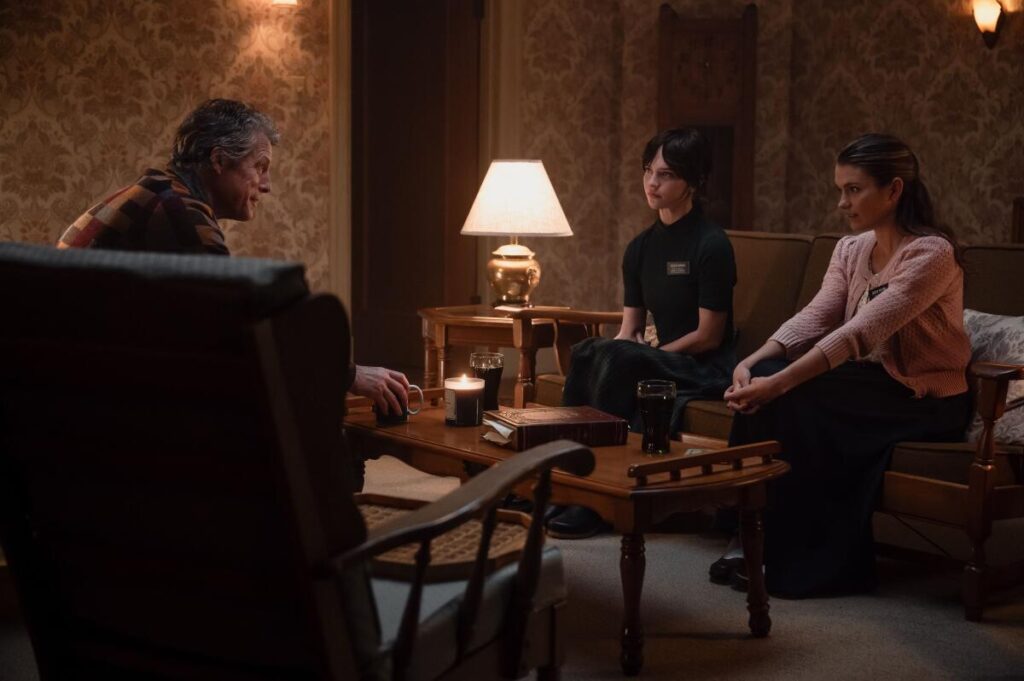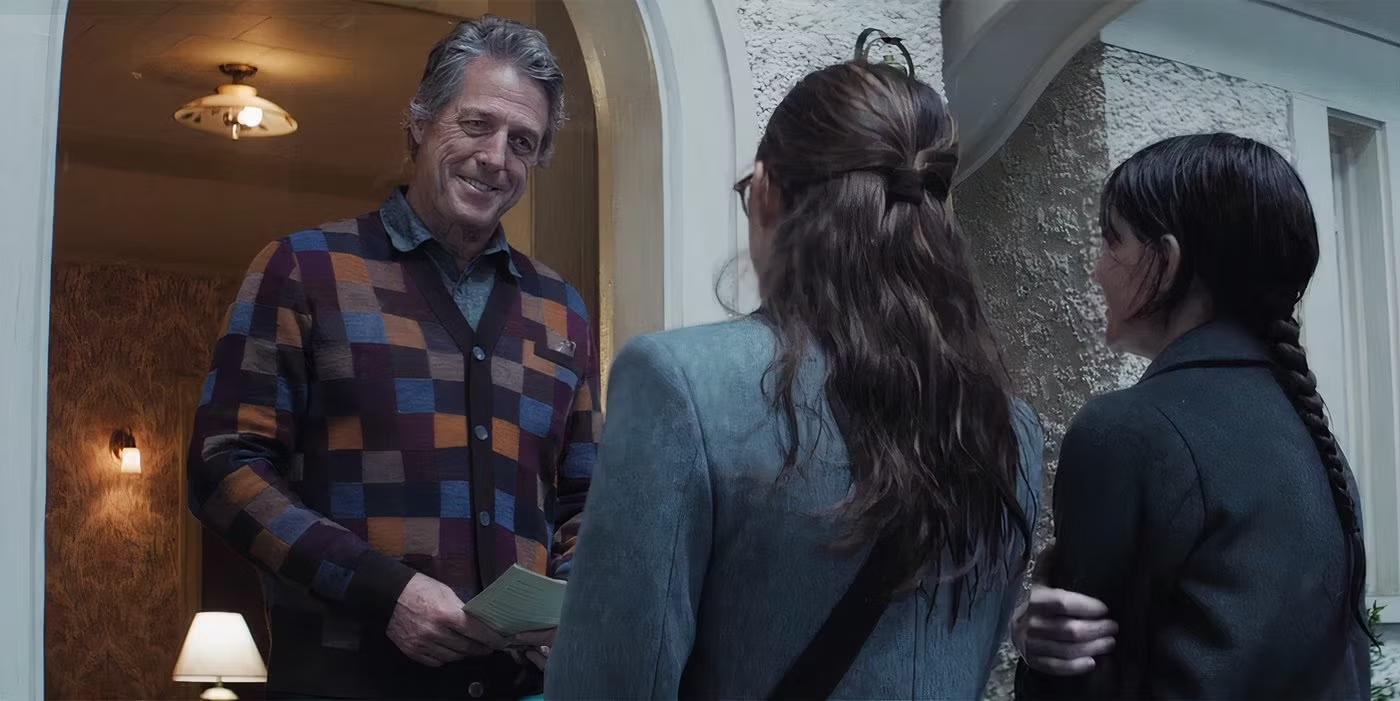In the new thriller Heretic, Hugh Grant makes a deliciously unexpected late career u-turn, his signature affability upended by sinister malevolence (his wit, thankfully, survives the transition). It takes a special performer to so skillfully subvert a public image—toss it, really—in such a decided declaration of reinvention. But Grant, who dominates this macabre exercise, does so on behalf of a fascinating character from writing-directing duo Scott Beck and Brian Woods, who don’t so much ask the enduring star to shed his well-loved charisma but rather to point it toward darkness lurking beneath.
When a pair of young Mormons knock on the door of Grant’s mild-mannered, cardigan wearing everyman, he sets out to teach them an insidious lesson, or three, about blind faith in religion (not to mention trusting thy neighbor). From the moment we meet Sister Barnes (Sophie Thatcher, enigmatic) and Sister Paxton (Chloe East), the do-gooders suggest a state of wavering doubt. Chatty Sister Paxton, a lifelong Mormon, is curious about the power dynamics of women in porn, while Sister Barnes, a recent convert, has a fixed faraway look (and distinct modernity) that screams “questioning.” A humiliating early prank and a well-composed shot of bicycles carried up a steep incline underscore their struggle to maintain the course in a modern world where organized religions swim upstream.
Enter the sharp-witted, and tongued, Mr. Reed (Grant), inviting them into his cozily secluded hillside home, one he purports to share with his strangely absent wife, the scent of fresh blueberry pie wafting from its nearby kitchen. Almost immediately, the garrulous host challenges the novice proselytizers’ theological resolve, needling at their past traumas while impressing with his vast knowledge of their very own The Church of Jesus Christ of Latter-day Saints. Why, exactly, he is so fascinated will be revealed in good time, but the screenplay is smart in the trio’s back-and-forth exchanges, setting up analogous straw men—using fast food preferences, vintage board games (Monopoly) and plagiaristic pop music derivations (The Hollies, Radiohead and Lana del Rey) to illustrate religion’s permutations across the ages (Judaism, Christianity and Islam). All of this is designed to shake the women’s belief in absolute truth.

This first part of this encounter, set entirely within the home’s living room and an elaborate library, places us a step ahead of its trusting heroines—this is a thriller and we know going in that Grant’s Mr. Reed is the baddie, skillfully constructing a cat and mouse game contrived to tilt in his favor. The warning signs are there from the beginning—an early aside about the home being outfitted with metal, hardly any windows and a strategically scented candle all add up to “RUN”. But since wide-eyed Sister Barnes and Sister Paxton are doing the lord’s work, what could really go wrong?
By the midpoint the home’s kitschy “coziness” morphs into a diabolical trap—claustrophobic, disorienting and cut off from outside communication. What follows is a game of theological chess, written with thorough care and frequent poignancy, pitting the women’s adherence to blind devotion against notions of free will. The film builds effective dread, teasing that something more horrifying than Reed’s theology lessons lurks within his belief of only “one true religion.”
Directors Beck and Woods have constructed a contained, twisty little suspense exercise as smart as it is scary. The inspired set design bears special mention, warmly inviting with just out of sight horrors that ratchet tension; a moment with a sculpture whose eyes glow in the dark, a terrific dioramic model of the house proper (which at one point takes on a literal rat-in-a-maze hunt) and a secret lair of successively locked rooms build menace. Throughout, Grant pushes himself toward something patently creepy, setting an intellectual mousetrap turned blood sport.
While Grant’s performance is the linchpin of Heretic, the very good Thatcher and East hold their ground as their lambs to the slaughter, both actresses believably confronting doubt (and possible death) under Reed’s relentless gaze while trying to outwit his menacing advances. Some of this sophisticated, strategic survival thinking pushes credulity in the closing confrontation. While the picture doesn’t fully escape the genre’s mandatory third-act descent into chaos, indulging in a few thriller tropes (ghoulish “prophets,” a subterranean labyrinth, and bloody violence), these moments are not missteps but rather nods to the genre’s demands and well-earned by the frequently terrific writing.
In its best moments, Heretic is a chilling study in belief and manipulation, anchored by Grant’s triumphantly twisted turn.
3 stars




I enjoyed it very much, but it seems like a big screenwriting miss in terms of how savvy the “final girl” (no spoilers) is. Did not make sense in terms of what we saw in the character of the two girls beforehand. That serious caveat aside, a smart and fun movie.
Hi Joel! I agree. I found the final sequence to be stretching credulity (to put it mildly) in terms of what her character was able to unravel and articulate. To me, it seemed quite out of character (though it might not have seemed such if it had been spoken by her counterpart). Glad you liked it. It’s been an okay year for horror films with some pretty good ones (Oddity, certain passages of LongLegs, The First Omen, Immaculate) and some not-so-good ones (Smile 2, In a Violent Nature, Trap, Cuckoo).